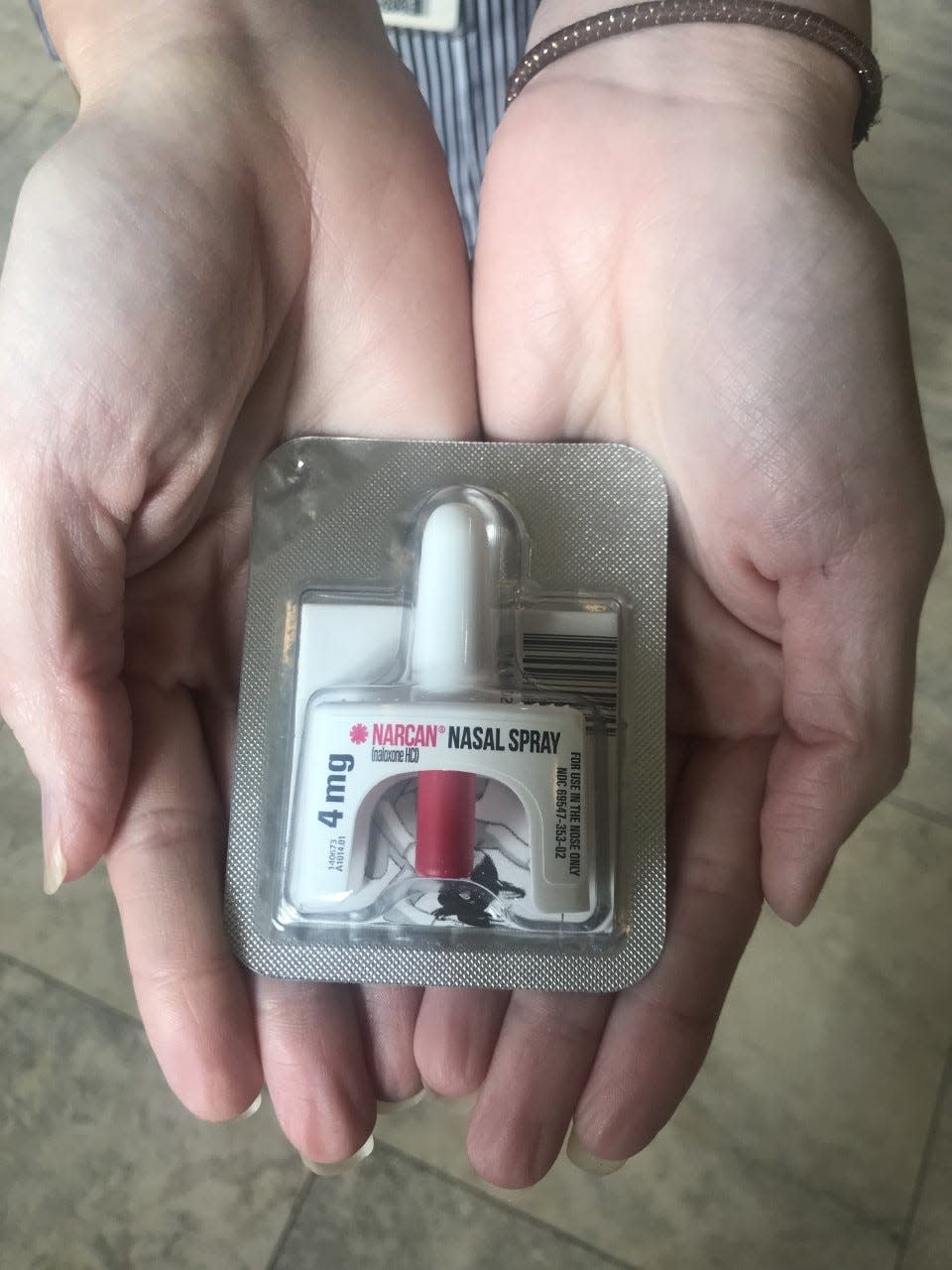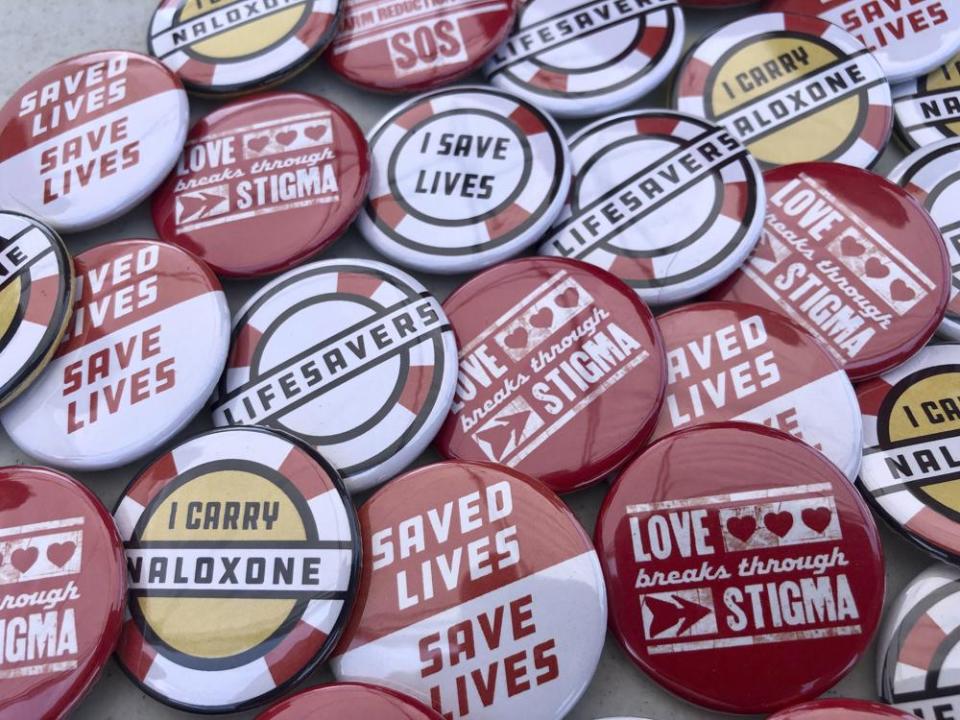After drug ODs spike, Tennessee opens up access to Narcan as a way to save lives
A change coming to Tennessee’s naloxone distribution law makes it much easier for health care providers, community groups like churches and government institutions to distribute naloxone, a safe and effective overdose rescue drug.
The change should saves lives amid a spike in overdose deaths.
"This is fantastic news especially in rural places throughout the state where they would have limited access to naloxone due to stigma or just lack of access," said Robert Childs, former executive director of the North Carolina Harm Reduction Coalition. "Organizations can basically set up their own medical standing order to get distribution of naloxone out there."
The law goes into effect July 1, and cities, counties, recovery organizations, hospitals, schools, homeless service providers, jails, shelters, community groups and many other organizations will be free to prescribe and distribute naloxone and other drug rescue medications. It removes barriers and gives family members easier access to the drug, which they can give to their loved ones during an overdose.
Tennessee experienced a major overdose crisis during the chaos of the 2020 pandemic. Fatal drug overdoses increased by 45% between 2019 and 2020, according to Tennessee Department of Health statistics.
Roughly 80% involved synthetic and prescribed opioids. Roughly two thirds involved fentanyl, which can be especially lethal.
"We see fentanyl more and more in the drug supply," said Genoa Clark of Choice Health Network. "We see a lot of folks who are not necessarily opioid users or don't think they're using opioids dying because they weren't expecting opioids at all, which is really scary."
What is naloxone?
Naloxone is used in emergency situations when drug users have overdosed.
Technically, it's an opioid receptor antagonist. It stops opioid drugs from interacting with the nervous system by preventing opioid molecules from attaching to receptors on nerve cells.
Think of it like breaking a key off inside a lock. Naloxone occupies the keyhole, preventing opioids from doing sometimes fatal damage.

It is fast-acting, safe and effective for treating overdoses and preventing overdose deaths.
"All it does is it saves people's lives," said Donnie Varnell, retired head of the North Carolina State Bureau of Investigation's environmental and drug division. "By keeping people alive, they may find a way to find a better way to live, improve their lives a little bit."
Like many others, he works to get the word about naloxone.
Health advocates say the change is a critical part of addressing the opioid crisis
The law effectively opens up who can have and administer emergency naloxone. Before, prescribers had to establish “good faith” through written communication and training-based “reasonable care” requirements for people administering naloxone in an emergency.
Narcan is now easier to use
Modern naloxone kits are extremely easy to administer and require minimal training. Clark said one of her clients had even administered it while driving on the highway to a friend who lost consciousness in the passenger seat.
"He didn't realize that his friend had used before getting in the car," Clark said. "But he had the spray and was able to reach over and spray it up his friends nose while driving, reviving him."
The law allows health care providers to prescribe doses organizations dealing with vulnerable populations so they can distribute them to people who need it.
"Before there wasn't much clarity on setting up a standing order, and this provides legal clarity," Childs said. "Community groups can set up programs and they don't have to wait for the state coordinator to come by. They can just run it."
Change is based on harm reduction
The growth of naloxone distribution in Tennessee has its roots in the harm reduction medical care. The purpose of harm reduction is to meet patients where they are, so they are given opportunities to direct their own care at their own pace, within their social circles, without stigma.
Childs explained that distributing naloxone this way is an opportunity to get people other types of care and services.

"We ask them about what's going on in their life," Childs said. "What else can we connect you with? What else are you ready for? It's not just giving naloxone, we're giving them naloxone plus connection to care to move them toward positive change."
Giving people ways to protect themselves from the worst consequences of substance use has been found by numerous studies to be an effective, low-cost way to save and change lives.
This is especially true in rural areas, where emergency help is far away or not available.
"I really hope it helps reach the more rural areas that haven't had steady access through the state or otherwise," Clark said. "I think this allows us an avenue to support those (rural) folks doing that work."
Having the drug available from organizations can help with communities that distrust law enforcement.
Advocates say that the results speak for themselves. Once someone is dead, it’s too late to help them.
"Maybe they can find a job or get housing," Varnell said. "And, hey, it's cheaper too than putting people in jail."
Clark was excited for the potential to open up access to grassroots mutual aid and rural health groups.
"I'm smiling because sometimes it's the little things that make a difference," said Clark. "I think there's a lot of different avenues that will open up not just for us but for places across the state trying to increase naloxone access."
How to get naloxone for you or a loved one
Choice Health Network, Cherokee Health and the Metro Drug Coalition distribute free naloxone to those who need it.
Naloxoneexchange.com sells naloxone online without a prescription for about $35.
Knoxville's Metro Drug Coalition schedules naloxone training by request.
Private pharmacies may carry naloxone but might only distribute it to those with prescriptions due to company policy.
If you or a loved one is prescribed opioids, it's a good idea to also ask for a prescription for naloxone.
This article originally appeared on Knoxville News Sentinel: Tennessee opens up access to Narcan in the hope of saving lives

